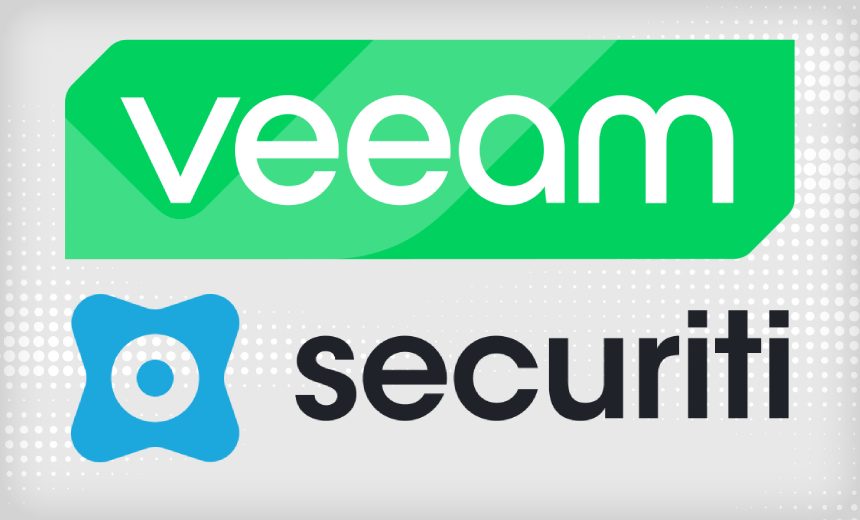Artificial Intelligence & Machine Learning
,
Data Privacy
,
Data Security
Deal Would Boost Veeam’s Cyber Footprint as Data Protection Vendor Valuations Surge

No cybersecurity market has enjoyed a bigger windfall from increased spending around agentic AI, generative AI and large language models than the data protection space.
See Also: When Identity Protection Fails: Rethinking Resilience for a Modern Threat Landscape
Rubrik’s stock price has more than doubled since going public in April 2024, and the Silicon Valley-company is now worth nearly $17 billion. Longtime public company Commvault also has enjoyed a resurgence since the start of 2024, with the Tinton Falls, New Jersey-based company’s stock price climbing nearly 150% over that time and notching a valuation of more than $8 billion.
The valuation bump has trickled down to privately held data protection companies as well, with Seattle-based Veeam tripling its market cap from $5 billion in early 2020 to $15 billion in December 2024, when it closed a $2 billion secondary offering that brought investors such as TPG into the fold alongside majority owner Insight Partners.
10 months later, how exactly Veeam intends to spend that money has come into focus. Bloomberg reported late Sunday that the data protection and ransomware recovery giant is in advanced talks to buy data security posture management and AI security vendor Securiti for $1.8 billion, with an announcement coming as soon as this week. Veeam and Securiti didn’t respond to Information Security Media Group requests for comment.
The deal would accelerate Veeam’s pivot from its heritage in the backup and disaster recovery market to being a true cybersecurity player. Although Veeam took the gold for enterprise backup and recovery software market share, its security tools are generally seen as lagging rivals such as Rubrik, with Gartner chiding Veeam for being unable to protect SaaS apps beyond Microsoft 365, Entra ID and Salesforce.
Veeam has turned to acquisition to expand its footprint in cybersecurity before, with the company scooping up 25-person Coveware in April 2024 to expand cyber extortion incident response. But Coveware pales in comparison to Securiti, which has around 1,000 employees, is backed by Citi Ventures and Capital One Ventures, and has raised $156 million, including a $75 million Series C in 2022.
Buying Securiti would align with the M&A strategy Veeam CEO Anand Eswaran articulated in a late 2024 interview with ISMG, in which he said the company prioritizes customer value and cultural fit over merely growing market share. That stands in contrast to Cohesity and Veritas, which have largely overlapping capabilities and merged in December 2024 to gain more scale in the competitive data protection space (see: Veeam Closes $2B Offering to Boost Data Resilience, Eyes IPO).
“We don’t believe in M&A for the sake of buying share,” said Eswaran, noting that future M&A targets for Veeam include SaaS protection, security adjacencies and GenAI-driven innovations. “I have a simple lens, which is, ‘Is this company or tech we buy accretive to our customers? Does it add more value to our customers and does it complement and accrue to the Veeam product suite?'”
What Sets Securiti Apart From Other Data Protection Players
Securiti has seemed destined for greatness since its establishment in 2019, winning the RSAC Innovation Sandbox Contest just a year after its founding. The company in 2022 took the silver in market share for the worldwide data privacy market, according to IDC, besting heavyweights like TrustArc, BigID and 1touch.io despite being founded 22 years, three years and two years later, respectively.
The company’s technology has also been well-regarded by analysts, with Securiti joining OneTrust and BigID atop Forrester’s 2023 privacy management software rankings and BigID, OneTrust, DataGrail and TrustArc atop IDC’s 2023 data privacy compliance software rankings, with Securiti earning top marks for its capabilities.
Specifically, IDC praised Securiti for having reporting and dashboards that are easy to configure and digest, and for offering auto-discovery of data assets from multi-cloud environments including technical metadata, security posture and access permissions. IDC said the emergence of many other vendors with deep data visibility capabilities means Securiti must evolve to keep pace with new market challengers.
Securiti has been led since its inception by Rehan Jalil, who ran Elastica for nearly four years before selling the cloud access security broker to Blue Coat Systems for $280 million in November 2016. Blue Coat was in turn sold to Symantec the following year, and Jalil led the behemoth’s cloud security business for more than two years until leaving to start Securiti in late 2018.
The company has pivoted in recent years from data privacy to data security posture management and AI security, two sectors which are ripe with M&A activity. At least seven DSPM startups have ended up in the hands of broader security or technology vendors since May 2023, while 12 AI security acquisitions have been consummated since September 2024, including five during September 2025 along.
Roughly two-thirds of Securiti’s employees are engineers, with 15% in sales, 15% in operations and the remainder in human resources, according to IT-Harvest. Even though Securiti’s headquarters are in San Jose, California, less than 15% of the company’s workforce is based in the United States, with roughly an equivalent amount in India. Pakistan leads the pack with some 30% of Securiti’s employees based there.
IT-Harvest estimates that Securiti generated $345 million in revenue over the past 12 months, and predicts revenue growth will increase by $600,000 over the next quarter. The company’s headcount has increased by nearly 20% over the past year, according to IT-Harvest.
Last year’s secondary offering gave Veeam the dry powder needed for industry-transformative M&A deals, and doubling down on the cybersecurity side of data protection will curry favor will public market investors if Veeam moves forward with an initial public offering.
But Securiti will give Veeam far more to digest than any of the company’s previous acquisitions, so if the deal proceeds, Veeam will have its work cut out around integration and ensuring Securiti retains its advantage around R&D.
